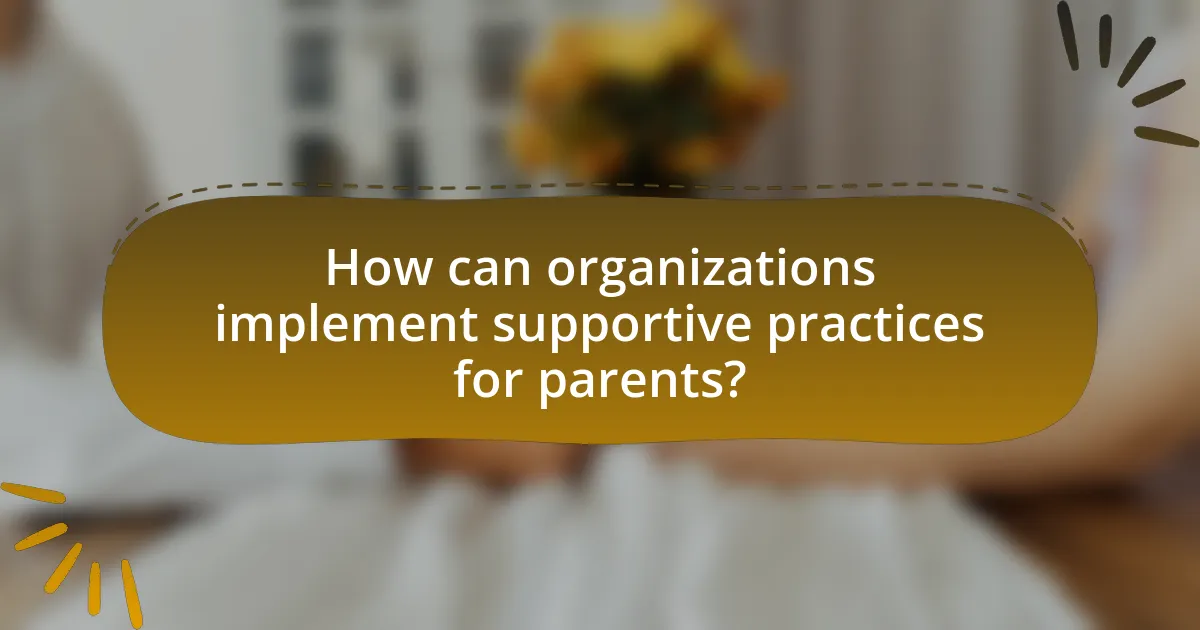Creating a supportive work environment for parents involves implementing policies and practices that address their unique needs, such as flexible work hours, remote work options, parental leave, and childcare support. Research shows that organizations with family-friendly policies experience higher employee satisfaction and retention rates. Key elements of a supportive environment include open communication, understanding of family responsibilities, and access to resources that help parents balance work and family life. By adopting these practices, organizations can enhance job satisfaction, productivity, and loyalty among working parents, ultimately benefiting both employees and employers.

What does it mean to create a supportive work environment for parents?
Creating a supportive work environment for parents means establishing policies and practices that accommodate their unique needs, enabling them to balance work and family responsibilities effectively. This includes offering flexible work hours, remote work options, parental leave, and childcare support. Research indicates that companies with family-friendly policies experience higher employee satisfaction and retention rates, as seen in a study by the Society for Human Resource Management, which found that 80% of employees value work-life balance initiatives.
How can a supportive work environment benefit parents in the workplace?
A supportive work environment benefits parents in the workplace by enhancing their job satisfaction and productivity. When employers provide flexible work arrangements, such as remote work options or adjustable hours, parents can better balance their professional and personal responsibilities. Research from the Society for Human Resource Management indicates that organizations with supportive policies experience lower employee turnover rates, which is particularly beneficial for parents who may seek stability for their families. Additionally, a supportive culture fosters open communication, allowing parents to express their needs and concerns, ultimately leading to increased engagement and loyalty to the organization.
What specific challenges do working parents face that a supportive environment can address?
Working parents face challenges such as balancing work and family responsibilities, managing time effectively, and dealing with stress related to childcare. A supportive environment can address these issues by offering flexible work hours, providing access to childcare services, and fostering a culture that prioritizes work-life balance. Research indicates that companies with flexible policies see a 25% increase in employee satisfaction, which directly correlates with improved productivity and reduced turnover rates.
How does a supportive work environment impact employee retention and satisfaction for parents?
A supportive work environment significantly enhances employee retention and satisfaction for parents by providing flexibility and understanding of their unique needs. Research indicates that organizations offering flexible work arrangements, such as remote work options and adjustable hours, report higher retention rates among parents. For instance, a study by the Society for Human Resource Management found that 55% of employees with flexible work options expressed greater job satisfaction, leading to increased loyalty and reduced turnover. Furthermore, supportive policies, such as parental leave and childcare assistance, contribute to a positive workplace culture, which is essential for parents balancing work and family responsibilities. This alignment between organizational support and parental needs fosters a sense of belonging and commitment, ultimately benefiting both employees and employers.
What are the key elements of a supportive work environment for parents?
Key elements of a supportive work environment for parents include flexible work arrangements, access to parental leave, and a culture of understanding and respect for family responsibilities. Flexible work arrangements, such as remote work options and adjustable hours, allow parents to balance their professional and personal commitments effectively. Access to parental leave policies ensures that parents can take necessary time off without fear of job loss, promoting their well-being and that of their families. A culture that values understanding and respect for family responsibilities fosters an inclusive atmosphere where parents feel supported, leading to increased job satisfaction and productivity. Research indicates that organizations with such supportive practices experience lower employee turnover and higher engagement levels, demonstrating the effectiveness of these elements in creating a positive work environment for parents.
How can flexible work arrangements contribute to a supportive environment?
Flexible work arrangements contribute to a supportive environment by allowing employees to balance their professional and personal responsibilities effectively. This flexibility reduces stress and enhances job satisfaction, which is particularly beneficial for parents managing childcare and work commitments. Research from the American Psychological Association indicates that organizations offering flexible work options report higher employee morale and lower turnover rates, demonstrating that such arrangements foster a more engaged and loyal workforce.
What role does communication play in fostering support for parents at work?
Communication is essential in fostering support for parents at work as it facilitates understanding and collaboration between employees and management. Effective communication allows parents to express their needs and challenges, enabling employers to implement supportive policies such as flexible work hours or parental leave. Research indicates that organizations with open communication channels report higher employee satisfaction and retention rates, particularly among working parents. For instance, a study by the Society for Human Resource Management found that 70% of employees felt more supported when their employers actively communicated about family-friendly policies. This demonstrates that clear and consistent communication directly contributes to a more supportive work environment for parents.

How can organizations implement supportive practices for parents?
Organizations can implement supportive practices for parents by offering flexible work arrangements, such as remote work options and adjustable hours. These practices allow parents to balance their professional responsibilities with family needs, leading to increased job satisfaction and productivity. Research indicates that companies with flexible policies experience lower employee turnover rates and higher morale, as demonstrated in a study by the Society for Human Resource Management, which found that 89% of employees reported improved work-life balance when offered flexible schedules. Additionally, organizations can provide parental leave policies that exceed legal requirements, access to childcare resources, and employee assistance programs focused on family support, further enhancing the work environment for parents.
What policies can organizations adopt to support working parents?
Organizations can adopt flexible work arrangements, such as remote work options and flexible hours, to support working parents. These policies allow parents to balance their professional responsibilities with childcare needs, leading to increased job satisfaction and productivity. Research from the Pew Research Center indicates that 56% of working parents find flexible schedules essential for managing work and family life. Additionally, offering parental leave policies, including paid maternity and paternity leave, can significantly enhance support for working parents, as studies show that such benefits improve employee retention and morale. Implementing on-site childcare services or partnerships with local childcare providers can further alleviate the burden on working parents, making it easier for them to focus on their jobs while ensuring their children are cared for.
How can parental leave policies be structured to benefit employees?
Parental leave policies can be structured to benefit employees by offering paid leave, flexible scheduling, and job protection. Paid leave ensures that employees can take time off without financial strain, which is crucial for their well-being and family bonding. Flexible scheduling allows parents to balance work and family responsibilities effectively, enhancing job satisfaction and productivity. Job protection guarantees that employees can return to their positions after leave, reducing anxiety about job security. Research indicates that companies with supportive parental leave policies experience lower turnover rates and higher employee morale, demonstrating the positive impact of such policies on both employees and organizations.
What are the best practices for creating a family-friendly workplace culture?
The best practices for creating a family-friendly workplace culture include offering flexible work arrangements, providing parental leave, and fostering open communication. Flexible work arrangements, such as remote work options and adjustable hours, allow employees to balance their professional and family responsibilities effectively. Research from the Society for Human Resource Management indicates that companies with flexible work policies report higher employee satisfaction and retention rates. Providing parental leave, both maternity and paternity, supports employees during critical family transitions, which can enhance loyalty and productivity. Additionally, fostering open communication encourages employees to express their needs and concerns, creating an inclusive environment. A study by Gallup found that workplaces with strong communication practices see increased employee engagement and performance.
How can training and resources enhance support for parents in the workplace?
Training and resources can significantly enhance support for parents in the workplace by equipping them with essential skills and knowledge to balance work and family responsibilities effectively. For instance, training programs focused on time management and stress reduction can help parents navigate their dual roles more efficiently. Additionally, resources such as flexible work arrangements and parental leave policies provide practical support that acknowledges the unique challenges parents face. Research indicates that companies offering comprehensive parental support see a 25% increase in employee satisfaction and retention, demonstrating the effectiveness of these initiatives in fostering a supportive work environment.
What types of training programs can help managers support working parents effectively?
Training programs that can help managers support working parents effectively include flexible work arrangement training, communication skills development, and diversity and inclusion training. Flexible work arrangement training equips managers with strategies to implement and manage remote work, flexible hours, and job-sharing options, which are essential for accommodating the needs of working parents. Communication skills development focuses on fostering open dialogue between managers and employees, enabling managers to understand the unique challenges faced by working parents and to provide appropriate support. Diversity and inclusion training raises awareness about the specific needs of working parents, promoting a culture of empathy and understanding within the workplace. Research indicates that organizations that implement such training programs see improved employee satisfaction and retention rates, particularly among working parents.
How can organizations provide resources to assist parents in balancing work and family life?
Organizations can provide resources to assist parents in balancing work and family life by implementing flexible work arrangements, offering parental leave policies, and providing access to childcare services. Flexible work arrangements, such as remote work options and adjustable hours, allow parents to manage their schedules more effectively, which is supported by research indicating that flexibility leads to increased job satisfaction and reduced stress levels among working parents. Additionally, comprehensive parental leave policies enable parents to take necessary time off for family responsibilities, which studies show can improve employee retention and loyalty. Access to childcare services, whether through on-site facilities or partnerships with local providers, further alleviates the burden on parents, as evidenced by data showing that organizations offering childcare support see higher employee productivity and engagement.

What are the measurable outcomes of a supportive work environment for parents?
A supportive work environment for parents leads to measurable outcomes such as increased employee retention, enhanced job satisfaction, and improved productivity. Research indicates that organizations offering flexible work arrangements and parental support programs experience a 25% reduction in turnover rates, as parents feel more valued and balanced in their roles. Additionally, a study by the Society for Human Resource Management found that 90% of employees reported higher job satisfaction when their workplace accommodated family needs, which directly correlates with increased engagement and productivity levels. These outcomes demonstrate the tangible benefits of fostering a supportive atmosphere for working parents.
How can organizations assess the effectiveness of their support for parents?
Organizations can assess the effectiveness of their support for parents by utilizing surveys and feedback mechanisms to gather direct input from employees. These tools allow organizations to measure satisfaction levels, identify specific needs, and evaluate the impact of existing support programs. For instance, a study by the Society for Human Resource Management found that 70% of employees reported that flexible work arrangements significantly improved their work-life balance, indicating that such support is valued. Additionally, organizations can analyze retention rates and productivity metrics to determine if parental support initiatives correlate with improved employee performance and loyalty.
What metrics can be used to evaluate employee satisfaction among working parents?
Employee satisfaction among working parents can be evaluated using metrics such as employee engagement surveys, work-life balance assessments, retention rates, and utilization of family-friendly benefits. Employee engagement surveys measure overall job satisfaction and specific aspects related to parental support, while work-life balance assessments gauge how well employees manage their professional and personal responsibilities. Retention rates indicate the stability of the workforce, particularly among parents, and high turnover may signal dissatisfaction. Additionally, tracking the utilization of family-friendly benefits, such as parental leave and flexible work arrangements, provides insight into how effectively the organization meets the needs of working parents. These metrics collectively offer a comprehensive view of employee satisfaction in this demographic.
How does employee productivity correlate with a supportive environment for parents?
Employee productivity significantly increases in a supportive environment for parents. Research indicates that when organizations provide flexible work arrangements, parental leave, and childcare support, employees experience reduced stress and improved job satisfaction. A study by the Society for Human Resource Management found that companies offering family-friendly policies see a 25% increase in employee productivity. This correlation arises because a supportive environment allows parents to balance work and family responsibilities more effectively, leading to enhanced focus and commitment at work.
What are some common challenges organizations face when creating a supportive environment for parents?
Organizations commonly face challenges such as inadequate policies, lack of awareness, and insufficient resources when creating a supportive environment for parents. Inadequate policies may include the absence of flexible work arrangements or parental leave, which can hinder parents’ ability to balance work and family responsibilities. Lack of awareness among management and employees about the needs of parents can lead to a culture that does not prioritize family-friendly practices. Additionally, insufficient resources, such as childcare support or employee assistance programs, can limit the effectiveness of initiatives aimed at supporting parents. These challenges can result in decreased employee satisfaction and retention, as studies indicate that organizations with supportive environments for parents experience higher levels of employee engagement and loyalty.
How can organizations overcome resistance to implementing supportive policies?
Organizations can overcome resistance to implementing supportive policies by actively engaging employees in the policy development process. This involvement fosters a sense of ownership and reduces apprehension about changes. Research indicates that when employees participate in decision-making, their acceptance of new policies increases significantly, as seen in a study published in the Journal of Organizational Behavior, which found that participatory approaches led to a 30% increase in policy acceptance rates. Additionally, providing clear communication about the benefits of supportive policies, such as improved work-life balance and enhanced productivity, can further mitigate resistance.
What strategies can be employed to ensure all employees feel included in support initiatives?
To ensure all employees feel included in support initiatives, organizations should implement diverse communication channels, provide tailored resources, and foster an inclusive culture. Diverse communication channels, such as surveys, focus groups, and open forums, allow employees to express their needs and preferences, ensuring that support initiatives are relevant and accessible. Providing tailored resources, such as flexible work arrangements and targeted training programs, addresses the unique challenges faced by different employee groups, enhancing their sense of belonging. Fostering an inclusive culture through regular diversity and inclusion training promotes awareness and understanding among employees, which is essential for creating a supportive environment. Research indicates that organizations with inclusive practices see a 30% increase in employee engagement and satisfaction, reinforcing the effectiveness of these strategies.
What practical steps can organizations take to create a supportive work environment for parents?
Organizations can create a supportive work environment for parents by implementing flexible work arrangements, such as remote work options and adjustable hours. These arrangements allow parents to balance their professional responsibilities with family needs, which is crucial for their well-being and productivity. Research from the Harvard Business Review indicates that flexible work policies can lead to increased job satisfaction and retention rates among employees with children. Additionally, providing parental leave policies that exceed the legal requirements can further support parents, as studies show that generous leave contributes to better mental health and family bonding. Organizations should also offer resources such as childcare assistance or partnerships with local childcare providers, which can alleviate the stress of finding reliable care. By taking these practical steps, organizations not only support their employees but also foster a more engaged and loyal workforce.
